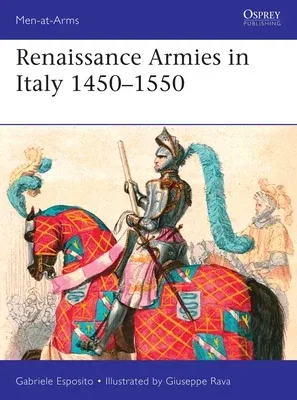This engaging study explains and illustrates the organization,
equipment, and campaign record of the various armies fighting within
Italy during the major wars of the period, which saw trained infantry
and firearms challenging the domination of heavy armored cavalry.
While the Italian Renaissance saw religion beginning to lose its primary
role in society to science and the arts, it was also a period of
political and military turmoil. Many regional wars were fought between
the states ruled by Milan, Venice, Genoa, Florence, the Papacy, Siena,
and Naples. For more than 50 years starting in 1494, major foreign
powers also exploited these divisions to invade Italy, which became the
focal point of their rivalries: both France and Spain made temporary
alliances with city states to further their ambitions, and early in the
16th century the Emperor Charles V sent armies from his German realms to
support the Spanish.
These wars coincided with the growth of disciplined infantry--carrying
not only polearms and crossbows but also hand-guns--which proved capable
of challenging the previously dominant armored knights in such
influential battles as Fornovo (1495), Cerignola (1503), Marignano
(1515), and Pavia (1525). All the powers involved made widespread use of
professional mercenaries, who were at the forefront of the early
development of the "pike and shot" era that succeeded the "High Middle
Ages." During this period, costumes, armor, and weapons all showed great
variety, due both to their national origins and to the evolution of
tactics and technology.
This masterfully illustrated study offers a fascinating insight into the
many armies which fought in Italy during this turbulent period,
explaining not only their arms and equipment, but also their structure
and successes and failures on the battlefield.

